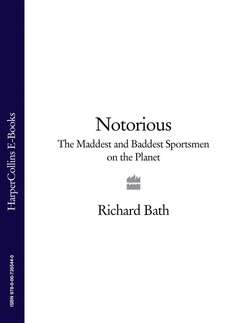Читать книгу Notorious: The Maddest and Baddest Sportsmen on the Planet - Richard Bath - Страница 25
JACK JOHNSON Mister unconventional
ОглавлениеContext is everything, and while the vast majority of today’s heavyweight boxers are black and bling, when Jack Johnson was growing up at the turn of last century, being loud and proud was a life-threatening state of mind. That was true in all of America, but was especially the case in the Deep South in Galveston, Texas when Johnson, the son of a sharecropper, was growing up.
Yet Johnson was never one to be restrained by convention. Having come up through the Battle Royals—where young blacks would fight pell-mell while whites watched—Johnson was old beyond his years. After he was arrested in 1903 (boxing was technically illegal in Texas and mixed-race boxing was definitely illegal across the whole of the south) he moved to Chicago and by 1907 he defeated former world champion Bob Fitzsimmons before going on to beat Canadian world champion Tommy Burns the next year.
However, the outrageous behaviour of the first black heavyweight of the world ensured that there wouldn’t be another for almost twenty-five years. Jack Johnson managed to offend every section of contemporary white American society, and many parts of black America weren’t exactly bursting with pride. As if it wasn’t bad enough that he showed no deference to whites or white society, Johnson had three wives, all of them white, and consorted openly with white prostitutes. When his first wife, nightclub owner Etta Duryea, blew her brains out, Johnson was already having an affair with another white woman, Lucille Cameron, whom he married shortly afterwards.
Johnson was clearly enjoying thumbing his nose at the social conventions of the time. One of his favourite tricks, for example, was to wind several feet of bandages around his member before going out to spar in tight shorts, which made him look absurdly well-hung. Almost as bad, he gloated about his victories and taunted his white opponents—white boxers did it all the time, but it was unheard of from a black man.
White society was appalled, and called for Johnson’s head. James J. Jeffries, who had never been knocked down in an illustrious career, was brought out of retirement to be the original Great White Hope, but when Johnson beat him in front of 22,000 spectators in Reno, Nevada, on American Independence Day in 1910, race riots erupted in thirty-nine cities across America, with more than a dozen people losing their lives in the process. Footage of Johnson winning was banned in virtually every southern state, including Texas, on the grounds of public safety.
Unable to beat him in the ring, White America pursued him out of it, invoking an obscure piece of legislation called the Mann Act, which was supposed to combat vice. When former girlfriend Belle Schreiber was forced to testify that Johnson had moved Cameron across state borders for immoral purposes, he was sentenced to a year and a day in prison for an offence that was usually treated as a minor misdemeanour. Johnson, reasonably fearing he wouldn’t last such a sentence, promptly fled the country.
A bloated and out-of-condition 37-year-old, he eventually lost his title to Kansan Jess Willard in 1915, losing in forty-five rounds in Havana.
